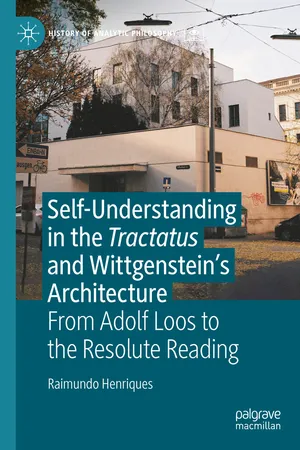
Self-understanding in the Tractatus and Wittgenstein's Architecture
From Adolf Loos to the Resolute Reading
- English
- ePUB (mobile friendly)
- Available on iOS & Android
Self-understanding in the Tractatus and Wittgenstein's Architecture
From Adolf Loos to the Resolute Reading
About this book
Between 1926 and 1928, the philosopher Ludwig Wittgenstein designed a house for his sister in Vienna (the Kundmanngasse ). This book aims to clarify the relation between that house and Wittgenstein's early philosophy. The starting point of its main argument is a remark from Diktat für Schlick (c. 1932-33) in which Wittgenstein proposes an analogy between ornaments and nonsensical sentences. The attempt to extract from it an account of the relation between the Kundmanngasse and the Tractatus Logico-Philosophicus (1921) leads to the writings of Adolf Loos (whose influence Wittgenstein recognized). The discussion of Loos's writings suggests that the analogy should be understood, not as one between actual ornaments and nonsensical sentences, but as one between Loos's and Wittgenstein's uses of these notions. So understood, it favors the (so-called) resolute reading of the Tractatus and reveals that both Wittgenstein's use of 'nonsense' and Loos's use of 'ornaments' are means to the end of promoting self?understanding. The book concludes that both the Kundmanngasse and the Tractatus are results of Wittgenstein's efforts at this kind of self?understanding. These can be construed as ways of acknowledging our humanity, which in turn can be seen as a unifying element of Wittgenstein's philosophy.
Frequently asked questions
- Essential is ideal for learners and professionals who enjoy exploring a wide range of subjects. Access the Essential Library with 800,000+ trusted titles and best-sellers across business, personal growth, and the humanities. Includes unlimited reading time and Standard Read Aloud voice.
- Complete: Perfect for advanced learners and researchers needing full, unrestricted access. Unlock 1.4M+ books across hundreds of subjects, including academic and specialized titles. The Complete Plan also includes advanced features like Premium Read Aloud and Research Assistant.
Please note we cannot support devices running on iOS 13 and Android 7 or earlier. Learn more about using the app.
Information
Table of contents
- Cover
- Front Matter
- 1. The Kundmanngasse and Its Significance
- 2. An Underappreciated Analogy from Diktat für Schlick
- 3. Loos on Ornaments
- 4. Nonsense in the Tractatus
- 5. Wittgenstein on Architecture and the Kundmanngasse
- 6. Functionalism and Self-Understanding
- Back Matter